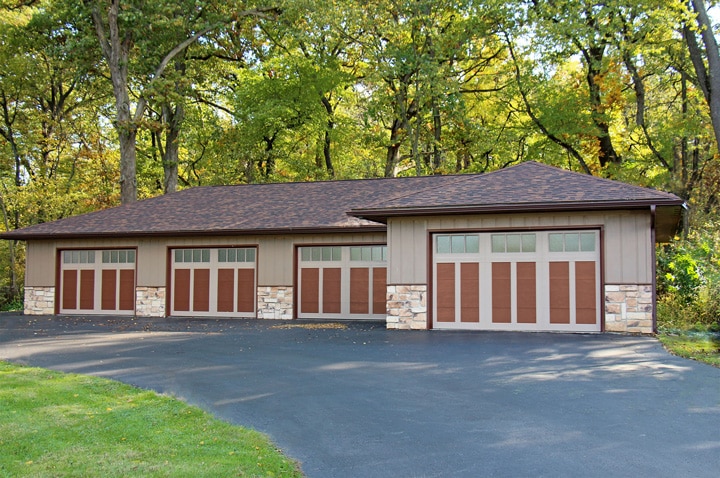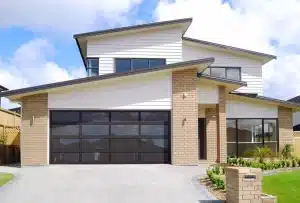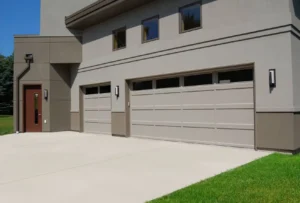Topics Covered:
Choosing the right garage door material can feel overwhelming with so many options available. Each material comes with its own set of strengths and weaknesses, so understanding these can help you find the perfect fit for your home. Let’s explore seven popular garage door materials in detail.
7 Popular Garage Door Materials
1. Steel: Strong and Dependable
Steel garage doors are widely favored for their durability and versatility. They can withstand a variety of weather conditions and provide a sleek, modern look. Steel doors are often insulated, making them energy-efficient and suitable for all climates. However, without proper coating, they may rust, and they’re susceptible to dents from impacts.
2. Wood: Timeless and Elegant
Wood garage doors offer a rich, classic aesthetic that adds a touch of sophistication to any home. They are highly customizable, allowing for unique designs, stains, and finishes. While wood exudes charm, it requires regular maintenance to protect against warping, rotting, and weather damage. It’s also one of the more expensive options.
3. Aluminum: Lightweight and Modern
Aluminum doors are a great choice for those seeking a contemporary look with minimal weight. They’re resistant to rust, making them ideal for humid or coastal areas. However, aluminum is less durable than steel and can dent easily. It may also require insulation if energy efficiency is a priority.
4. Vinyl: Durable and Weather-Resistant
Vinyl garage doors are tough, weather-resistant, and require little maintenance. They’re particularly popular in regions with extreme weather as they don’t rust, warp, or fade. While vinyl is durable, it offers limited color and design options and can crack in extremely cold temperatures.
5. Fiberglass: Lightweight and Versatile
Fiberglass doors combine durability with a lightweight design. They can be made to resemble wood, offering a stylish look without the upkeep. However, they may fade or crack after prolonged exposure to sunlight or extreme temperatures, and they provide less insulation unless specifically designed to do so.
6. Glass: Sleek and Stylish
Glass garage doors are perfect for homeowners who want to make a bold, modern statement. They allow natural light to flood into the garage, creating a bright and inviting space. On the downside, they offer less privacy unless frosted or tinted and can be more expensive and heavier than other materials.
7. Composite: Durable and Versatile
Composite garage doors combine the best features of wood and steel. They’re designed to mimic the appearance of wood but are more resistant to weather and pests. Composite doors are durable and require less maintenance than real wood. However, they are heavier than most materials and can be pricey, though generally less costly than solid wood.
Quick Comparison Chart: Pros and Cons of Garage Door Materials
| Material | Pros | Cons |
|---|---|---|
| Steel | Strong, durable, low maintenance | Can rust, prone to dents |
| Wood | Beautiful, customizable | High maintenance, expensive |
| Aluminum | Lightweight, rust-resistant | Dents easily, needs insulation |
| Vinyl | Weather-resistant, low maintenance | Limited design options, cracks in cold |
| Fiberglass | Lightweight, wood-like appearance | Fades over time, less insulation |
| Glass | Modern, allows natural light | Expensive, privacy concerns |
| Composite | Durable, mimics wood, low upkeep | Heavier, moderately expensive |
Each garage door material has unique qualities that make it suitable for different needs and preferences. Whether you prioritize aesthetics, durability, or cost, understanding these materials’ pros and cons will help you make a smart choice that enhances your home’s value and functionality.




